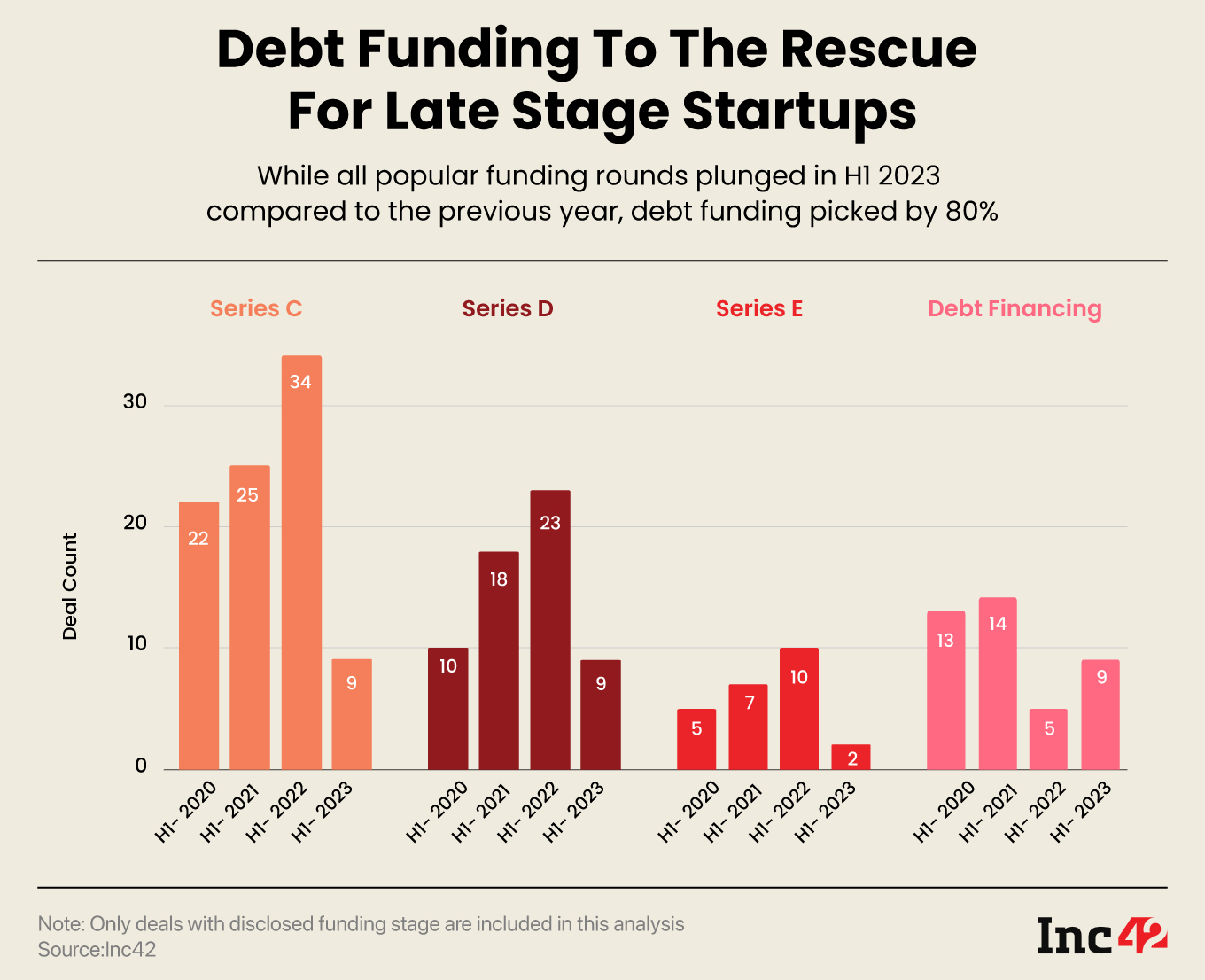Debt funding rose 80% YoY in H1 2023, accounting for 4.81% of the total $5.4 Bn raised by the Indian startup in the first six months of the year
One of the major debt funding deals observed in H1 2023 was neobank startup Stashfin, which raised $100 Mn from Innoven Capital and Trifecta
Debt funding could seem to be a lucrative option to many founders, however, suggest that it should not be the substitute for the non-availability of equity-based funding
The funding winter has continued to tether Indian startups and investors in a tight spot. Among global economic meltdown, both the number of deals and funding amount have continued to plunge since the beginning of 2022. This has pushed startups to look for alternative ways to secure funds. One of these alternative routes is debt funding.
According to Inc42’s H1 2023 Startup Funding Report, Indian startups raised a total of $260.7 Mn in debt funding between January and June 2023 (H1 2023). This is more than double than the $89.3 Mn debt funding raised in H2 2022.
Moreover, the percentage of debt funding in total funding (equity+debt) raised by startups has also jumped this year. Debt funding accounted for 4.81% of the total $5.4 Bn raised by the Indian startup in the first six months of 2023. This is a big jump over 1.48% of the total $6 Bn raised by startups in H2 2022.
One of the major debt funding deals observed in H1 2023 was neobank startup Stashfin, which raised $100 Mn from Innoven Capital and Trifecta. Some of the other top deals include Mensa Brands ($36.2 Mn), LEAD School ($19.2 Mn), and PocketFM ($16 Mn), among others.

According to Ankur Bansal, the cofounder and director at Blacksoil Capital, the drying up of venture capital (VC) money has played a significant role in the current preference for debt financing among startups.
“With VC funding becoming more scarce or highly competitive, startups are exploring alternative avenues to secure capital for their growth and operations,” he added.
According to Inc42’s half-yearly analysis of funding trends, Indian startups raised a total of $5.4 Bn between January and June 2023, down 10% sequentially and 55% yearly. Further, most debt funding has been raised by late stage startups. While the late stage equity funding deal count (Series C & above) fell a massive 70%, debt funding deals rose 80% YoY.
This comes at a time when many debt funds have been announced in the last 18 months, including Lighthouse Canton ($67.3 Mn), Stride Ventures Fund III ($100 Mn), AIF Grand Anicut Fund II ($110 Mn), and Alteria Capital ($122 Mn), among others.
Besides venture debt there has been a substantial rise in revenue-based financing, wherein investors receive a regular share of the businesses income until a predetermined amount has been paid. Some of the popular platforms helping startups raise revenue-based financing are GetVantage, BHIVE Investech, Klub, and Velocity, among others.
Is Choosing Debt Over Equity The Right Thing To Do?
Debt financing caters to raising a sum of money from a bank or a non-bank lender basis the loan servicing capacity of a company through its revenues or assets.
According to logistics tech startup COGOS’ cofounder and CEO Prasad Sreeram, an early stage startups may prefer to opt for an equity financing route. This is because at this stage many startups do not have a strong revenue stream or assets to service a loan. However, when startups begin to head towards profitability, they are advised not to liquidate too much.
“Equity money is expensive money. You could be loosing control of your company and may sign up for a lower valuation in haste. With debt financing, you can build more value for the existing investors,” he added.
In comparison to equity, debt financing offers a viable solution, allowing companies to access funds without diluting their ownership stake or giving up control. Additionally, in situations where startups anticipate a potential decrease in valuation or down rounds, they may be hesitant to raise equity as it could further erode their valuation.
Companies that have a solid track record, established operations, and predictable cash flows are often well-suited for debt funding. Lenders are more willing to provide debt financing to companies with a proven ability to generate consistent revenue and meet debt repayment obligations.
Further, debt financing is commonly used to finance mergers and acquisitions (M&As). By raising debt, companies can quickly access funds to facilitate the acquisition or merger process, leveraging the assets or future cash flows of the target company as collateral for the loan.
“When interest rates are low or competitive, it can be an opportune time for companies to seek debt funding. Lower cost of borrowing allows companies to take advantage of cost-effective capital,” added Bansal.
However, COGOS’ Sreeram advises startups to be cautious when going for debt funding. “Often, debt providers not only look at a startup’s revenues but also their existing fund availability, assets and existing pool of equity money they have. But for startups, until and unless they are sure whether they will be able to service the loan in future, it’s not a right path to take,” he added.
Also, in certain situations, startups may fail to follow the terms and conditions of the lender, putting the founders in a bind. The recent BYJU’S debt crisis is a clear example of this. The edtech unicorn raised a term loan B (TLB) of $1.2 Bn in 2021. BYJU’S has been trying to negotiate with the creditors of its TLB to restructure the loan amid financial difficulties. However, the lenders sought a prepayment of $200 Mn, along with a higher interest rate, as a precondition to restructure the TLB.
In another event, BYJU’S has not yet received the entire $250 Mn (about INR 2,000 Cr) of debt funding committed by the US-based alternative investment firm Davidson Kempner.
A Similar example is of healthtech unicorn PharmEasy. The company borrowed INR 2,280 Cr ($285 Mn) from Goldman Sachs in August 2022 to pay off an earlier debt it had incurred from Kotak Mahindra Bank to buy Thyrocare, a chain of diagnostic labs. The loan was said to be a five-year arrangement, attracting an annual interest rate of 17-18%. However, it was unable to keep its loan terms, resulting into a dispute.
The last 18 months have been tough for Indian startups, especially the ones that are sitting on heavy losses and have seen valuation markdowns, layoffs, consolidation, and shutdowns. In addition, there seems to be no immediate respite from the ongoing funding dry spell.
In such a scenario, debt funding could seem to be a lucrative option to many founders. However, caution is advised as debt funding should not be made the substitute for non-availability of equity-based funding.
































 Ad-lite browsing experience
Ad-lite browsing experience